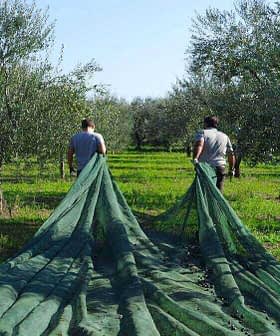Record Number of Awards for Spanish Producers at NYIOOC
Spanish producers enjoyed a record-breaking night at this year's NYIOOC, enjoying their highest ever success rate and bringing home more Gold Awards than ever before.
 Henri Alegria accepted the Gold Award for Henri Mor
Henri Alegria accepted the Gold Award for Henri MorThe 2019 edition of the New York International Olive Oil Competition was a good one for Spain, both in terms of entries and in terms of awards.
With 154 entries, three up from last year, Spain had the second most contenders in New York, just after Italy, which had 223, and well ahead of Greece, 109, and the United States, with 96.
We’ve been making top quality olive oils for 20 years. It’s a lot of time and effort and we are very proud of this recognition which places us at the level of those who appreciate quality.
This strong presence of Spanish olive oil producers was also reflected in the awards granted by the 18 members of the jury.
Four Best in Class, 84 Gold and 25 Silver awards travelled to the southwestern European country. This means that 74 percent of the Spanish producers taking part at the NYIOOC earned an award, one of the highest success rates among the top producing countries and 11 points higher than in 2018.
See Also:NYIOOC 2019 ResultsOro Bailén’s quality has been acknowledged at the NYIOOC in the last four editions.
This year, the olive oil produced by the Gálvez González family in Bailén, at the heart of Jaén province, the main production region in Spain, deserved a Best in Class for its medium Picual, a Gold award for its Arbequina and Hojiblanca and a Silver award for its Frantoio.
“We’ve stopped participating in many competitions, but we keep coming to New York because, on top of the personal satisfaction that comes with the awards, this contest is much valued by our clients in the U.S. and Canada,” Edurne Rubio, commercial director of Oro Bailén, told Olive Oil Times.
Her opinion is shared by Borja García, commercial director of Finca La Torre, a well-known quality brand from Antequera, in the southern Andalusian province of Málaga, which was also awarded in the three previous editions of the NYIOOC.
This year, its organic Picudo and Hojiblanca won a Gold award while its Cornicabra and Arbequina took one Silver award each.
“The NYIOOC is a key reference in the U.S. I guess it’s the most important contest on the other side of the Atlantic both because of the reputation of the jury and the promotion of the event. It is very important for us,” he told Olive Oil Times.
When asked about the reasons behind Finca La Torre’s sustained success, García points to the “hard and meticulous work” of Víctor Pérez, the manager of the estate.
“He never fails. Since he started producing olive oil seven years ago, he’s been up there and that is invaluable. We’ve had problems with the harvest as anyone does. This year we were hit by floods, but the next day we were harvesting,” García said.
Tim Balshi and his wife, Soraya Aguilar, live in Pennsylvania, but they are part of the family-run company, Almazara Andrés Aguilar, whose Mill Press olive oil brand won three Gold and two Silver awards in New York.
“We’re very excited and very happy. We see the NYIOOC as a top contest in the world and what they are doing for the industry’s quality is exceptional,” Balshi, quality director and co-founder of Millpress Imports, told Olive Oil Times.
“We’ve been making top quality olive oils for 20 years. It’s a lot of time and effort and we are very proud of this recognition which places us at the level of those who appreciate quality. And this also motivates us to work harder for future harvests,” Aguilar, exports director of the company, added.
Mill Press olive oil mill is situated in Linares, in the province of Jaén, home of around 25 percent of the world’s total olive oil production.
In spite of the remarkable presence of Andalusian producers, the 154 Spanish brands who took part at this year’s NYIOOC draw a map of the huge diversity of Spain’s olive oil production.
Owned by the Mora family, Palacio de los Olivos is a 518-acre estate in Almagro, in the region of Castilla La Mancha, an area well suited for growing olive trees but outside of the main Picual producing area of Jaén.
In 2018 and 2017 they received a Gold award for their robust Picual. This year they earned a Best in Class.
“It’s not that easy to win awards. The reality is that hundreds of olive oil brands get none. So our oil must have something good,” María Martínez Ubago, the head of communications at the company, said.
Equally proud of his oil is Henri Alegría, owner of the brand Henri Mor, which won two Gold awards for its medium Arbequina and its organic delicate Arbequina.
“We are extremely pleased. The U.S. is our main market as almost 70 percent of our exports go to America, especially to New York,” Alegría told Olive Oil Times.
This Venezuelan-born producer started his production just three years ago when he moved back to his grandparent’s village of Juncosa, in Catalonia, and fell in love with olive trees and olive oil production.
“This helps a lot because among all the international competitions, New York’s the one with the strongest presence on the Internet and social media,” he said, when asked for the reasons why these awards are important.
Spain is the world’s leading olive oil producer. With 1,589,900 tons produced in the 2018/2019 season, the European country largely surpasses its closest competitors. In the same period, Italy and Greece, the second and third largest producers, produced 265,000 tons and 225,000 tons, respectively.
However, despite its strong performance at the NYIOOC, Spain still sits behind Italy when it comes to the total number of awards.
“I guess the quality of Spanish olive oil is growing every year. There’s a huge evolution in the olive groves, but we have to do a better job in terms of communication,” Alegría said, as one of the reasons.
Rubio, from Oro Bailén, claims that educating consumers to value good olive oil will be key in order to improve quality and places a special role for olive oil contests on that task.
“Spain’s produced high volume for years and quality is getting better,” she said. “I believe olive oil contests can improve the knowledge about olive oil and promote quality. At the end of the day, quality olive oil is not more expensive because it comes in a nicer bottle but because it’s good and it’s made in a special way.”








